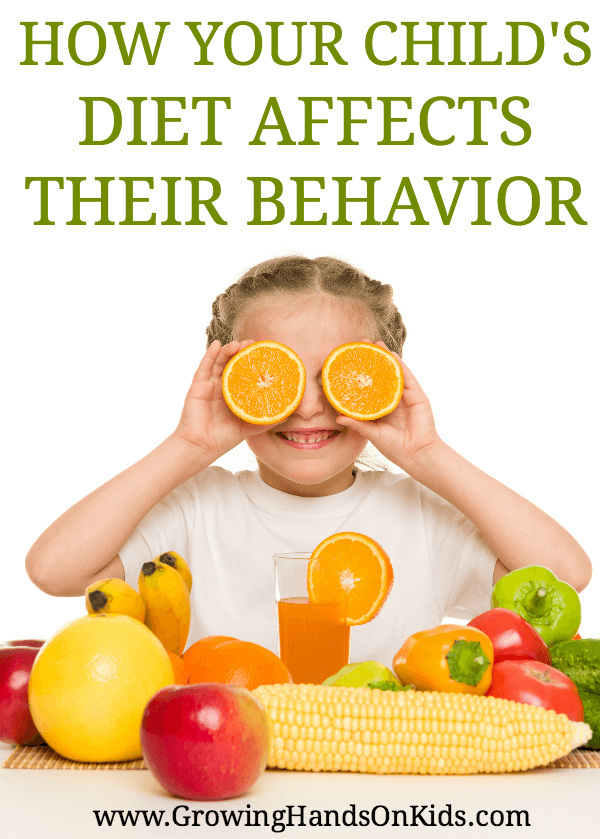Does Your Child’s Diet Affect Their Behavior? Is it Behavior? Or is it Sensory? a series
Affiliate and Referral links are used below to promote products I love and recommend. I receive a commission on any purchases made through these links. Please see my disclosure policy for more details. As an Amazon Associate, I earn from qualifying purchases.
It is time for another post in my Is it Behavior? Or is it Sensory? series! Today we will be looking at how your child's diet affects their behavior.
The saying “You are what you eat” is definitely very true, especially in the case of children. Your child's diet does affect their behavior.
If you have a child who has sensory issues already, plus behaviors and food allergies, it is very easy to see how their diet can affect their behaviors.
Did you know what 1 in every 13 children have food allergies? And over 15 million Americans also have food allergies! (Resource: Food Allergy Research Facts & Stats).
When your body is fighting an allergy, it puts your body under a lot of stress.
Remember two weeks ago when we talked about how stress affects your child's body and the response is a fight or flight behavior? When your child's body is reacting to either a food allergy OR is lacking in basic nutrients from foods, especially green leafy vegetables, the response can often be a fight or flight type behavior.
Their body is under attack, so to speak, and so their bodies begin to respond. Since most little children don't know why their body is responding this way, they will often act out or have adverse behaviors due to what is going happening on the inside.
The perfect example of this is a dairy allergy. My brother and I both had chronic ear infections growing up. It was to the point where we almost needed tubes put in our ears. My mom had just become a vegetarian and had learned that dairy products can cause a lot of problems for children, in particular milk. So she took us off ALL dairy products. Literally within a few weeks, our ear infections went away and we did not have problems with them anymore and we didn't need tubes.
I was recently talking to a friend of mine and we were discussing her son's behaviors. She was having a REALLY rough time with him misbehaving, not listening, and overall acting like a “wild man” more than usual. He had just been on vacation out of state and had eaten some dairy products that she typically does not allow him to have at home. She made the comment that she could tell, just by looking at his face, that he was reacting to a food issue. It took him about a week to be home and to get the dairy out of his system before he began to calm down and act like his normal self again.
Now, before we go on, I want to stress that I am NOT a dietician. Before you make ANY major changes in your child's diet you need to consult your doctor or a dietician that specializes in food allergies and children's nutrition.
However, I do think that A LOT of our children's behaviors are the result of what they are eating. Think of all the dyes, processed ingredients, additives, and other “junk” that is put into our food on a daily basis? And it is deemed fit for human consumption?! Obviously, there is something to this if we are seeing food allergies on the rise, childhood obesity, etc. This is where educating yourself on what is really in our food and how you can avoid those things in your family's food is so important.
As a country, in general, we eat more processed foods, sugars, fats, and oils than we ever have in our nation's history. The reason for this is probably accessibility, as well as a much busier lifestyle. Often times, both parents are working outside the home and we are so busy with life in general that having a well-rounded, nutritious, home-cooked meal is not as high on the priority list.
And even if you do make it a priority to make sure your family is eating as healthy as possible, there are still additives, dyes, and other added ingredients that a lot of us don't even think of. GMO's, processed sugars, processed wheat, etc. are in foods that most of us would consider healthier options.
And then there are children, who just in general, are hungry. For whatever life circumstances or reason, they come to school each day hungry and often times are only eating because the school provides meals for them. Numerous times, I would ask children I was working with what they had for breakfast that morning. Many times I heard “nothing”, or they would say they had a cookie or some type of surgery breakfast cereal with absolutely NO nutritional value to it at all. And then these children are expected to sit still and learn. Their bodies are literally NOT able to do this because of either hunger or just poor nutrition in general.
In order to learn, your children's brains need to be fed with the nutrients it needs in order to function properly and be at the best potential.
Here are some other articles I have here on the blog that can help you get started on a healthier lifestyle for you and your kids:
Resources for Dealing With Food Allergies in Children
If you suspect your child is dealing with a food allergy, the best thing to do is to talk to your child's doctor or a dietician. Many times they may ask you to try elimination diets or do special testing to figure out what your children's allergy is. Food allergies can start really as soon as a child is born!
My daughter was a very colicky baby. I tried cutting out dairy and a few other foods while breastfeeding to help. We also ended up going to a chiropractor that specialized in gentle techniques for children and we also did probiotics. These two things were definitely a lifesaver for us! Thankfully she does not have any major allergies at the moment, however, she does have skin reactions to certain foods (mostly acidic fruits such as strawberries and a couple of others). I am going to be discussing this with our doctor at our next well visit check up!
The bloggers of iHomeschool Network have an amazing G+ Hangout that they just did on teaching kids to eat healthily. They also discuss allergies, sensitivities to foods and textures, and what they have done to help with these things in their families. You can watch the video below on youtube.
Therapy Works LLC also offers Nutrition Counseling with a Registered Dietician as part of their services. Debra Dickson, RPT is the one who runs Therapy Works LLC and her 2-day workshop for therapists is where I got a lot of the information for this series. She talked in great detail about how important diet and nutrition is as part of the treatment plan for children with behavior and sensory issues. I definitely recommend getting in contact with her company.
How to Deal with Picky Eaters?
What if you are that parent that pays very close attention to your child's diet and tries to make sure they have a well rounded, nutritious meals?
And what if you are dealing with an already picky eater that has taste and texture sensitivities and it is challenging to get them to eat healthy options?
Since dealing with food and texture sensitivities is not my area of expertise per se, I am going to reference some helpful resources for you below!
- Your Kid's Table – A fellow pediatric Occupational Therapist who specializes in sensory and food and picky eaters. She also offers consulting services!
- Tips for Getting Picky Eaters to Eat
- SOS Approach to Feeding
- Just Take a Bite: Easy, Effective Answers to Food Aversions and Eating Challenges!
- Is it Behavior? Or is it Sensory?
- The Vestibular System
- Diet & Nutrition
- Sleep & Screen Time
- Problem Solving Discipline & Sensory Processing
Want a Printable Version of This Behavior vs. Sensory Series?
I have a printable version of the entire 5 post series that you can download when you subscribe below. Just enter your e-mail address and click the “DOWNLOAD” button. You will need to confirm your subscription in the e-mail you receive in your inbox (double check your spam box if it does not show up in your inbox).
Once you have confirmed your subscription, you will receive the download automatically to your computer. Double-check your downloads folder so you can save it to your computer for future reference.
You can also keep up on all my posts on Pinterest.
Follow Heather @ Golden Reflections Blog's board From Golden Reflections Blog on Pinterest.

Heather Greutman, COTA
Heather Greutman is a Certified Occupational Therapy Assistant with experience in school-based OT services for preschool through high school. She uses her background to share child development tips, tools, and strategies for parents, educators, and therapists. She is the author of many ebooks including The Basics of Fine Motor Skills, and Basics of Pre-Writing Skills, and co-author of Sensory Processing Explained: A Handbook for Parents and Educators.



Hi! I’m a registered dietitian nutritionist specializing in this area! I love this article and I would love to create something together!
This is such a great post. Parents need to understand that diet definitely affects a child’s behavior. I’m a huge advocate for healthy eating and natural behavior management techniques. Thank you!
My daughter didn’t sleep through the night till she was a week shy of 4 yrs old. What finally worked was taking dairy out of her diet completely. It was amazing – a week of no dairy and she was sleeping through the night. After 6 solid nights of sleep, after her being up from 2 to 20 times each night, I decided to test the theory. I overloaded her with milk products. She was up 6 times that night. We learned over time she could have 6 oz at lunch, any later and she was up, any more and she was up. We didn’t have behavior issues, just no sleep for 4 yrs!
Wow! That is amazing!! Thanks for sharing your story!!
I am a HUGE believer in changing diet to resolve issues from autism to eczema.
My daughter, now 6.5, was diagnosed with Sensory Processing Disorder when she was 2. I took a chance on the GAPS diet. It changed her life (and mine). She no longer qualifies for the disorder. She is a happy, smiling, calm 6 year old. I spent 2 years faithfully adhering to the GAPS diet, and while it was incredibly hard, it was SO worth it. We don’t even have to stay on the diet now… We can eat what we want, though I try to keep grains at a minimum most of the time… She’s cured.
I’m curious as to how your 2yr old dtr was seen to have SPD. How did it exhibit itself so early? My son was around 8 yrs old when diagnosed and diet was never mentioned. Thanks!
Hi Sarah,
My daughter does not have a diagnosis of SPD actually. I was just sharing a personal story from our experience with food sensitivities and how it affected her behavior. Food sensitivities and allergies can affect children’s behavior even if they don’t have an official diagnosis of anything, however in children with SPD it can make those behaviors even more un-manageable. Sorry if that was confusing.
Hey Sarah,
My husband pointed out the fact to me that you were replying to Mrs.Momof6. So sorry I answered your question when you meant it for her. When I saw your comment came through it didn’t show that you were replying to someone! 🙁